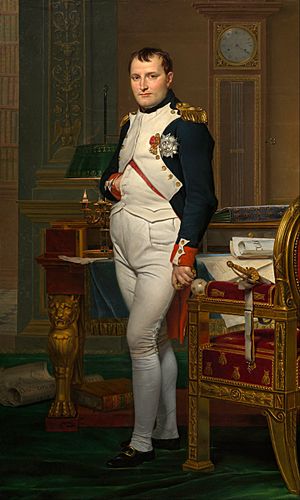Napoleonic era facts for kids
| 1799–1815 | |

The Emperor Napoleon in His Study at the Tuileries by Jacques-Louis David
|
|
| Preceded by | French Directory, French Revolution |
|---|---|
| Followed by | Bourbon Restoration, Concert of Europe |
| Monarch | Napoleon Bonaparte |
| Leader(s) | Napoleon Bonaparte |
The Napoleonic era was an important time in the history of France and all of Europe. It was the final part of the French Revolution. This period began when Napoleon Bonaparte took power in France. He did this through a coup d'état, which means he quickly took control of the government. This happened in November 1799.
Napoleon brought order to France after many years of revolution and war. He made peace with the Roman Catholic Church. He also created the Civil Code in 1804. This was a new set of laws that made all adult men equal under the law. It also meant people could get jobs and education based on their skills, not their family name. However, it also made women and children less powerful in the family.
While making France strong, Napoleon also wanted to expand his power across Europe. His armies took over many lands, like parts of Spain and Italy. He even made countries like Austria, Prussia, and Russia become his allies. This meant France was very powerful in Europe. But the United Kingdom never agreed to French control and kept fighting against Napoleon.
Contents
Napoleon's Rise to Power
Napoleon Bonaparte was a brilliant military leader. He became famous during the French Revolutionary Wars. People in France were tired of the chaos after the revolution. They wanted a strong leader.
In 1799, Napoleon seized control of the French government. He became the First Consul of France. This gave him a lot of power. He worked to bring stability back to the country.
Reforms and New Laws
Napoleon introduced many changes to France. One of his most important achievements was the Civil Code. This code of laws is still important today.
- It made sure all men were equal before the law.
- It protected property rights.
- It helped create a society where people could succeed based on their abilities.
He also improved the French economy and education system. He wanted a strong, organized France.
Wars Across Europe
Napoleon's desire for power led to many wars across Europe. These are known as the Napoleonic Wars. France fought against many other European countries, including Britain, Austria, Prussia, and Russia.
French Victories
Napoleon's armies were very successful for a long time. They won many important battles. He used new military tactics that surprised his enemies.
- He conquered large parts of Europe.
- He set up new kingdoms and put his family members or allies in charge.
- This created a huge French Empire that stretched across the continent.
The Fight Against Britain
The United Kingdom was a constant enemy of Napoleon. Britain had a very strong navy. They controlled the seas, which made it hard for Napoleon to invade them.
- The British navy defeated the French fleet at the Battle of Trafalgar in 1805.
- This battle showed that Britain would not give up.
The Fall of Napoleon
Napoleon's empire started to weaken in 1812. He made a big mistake by deciding to invade Russia.
The Russian Disaster
Napoleon led a huge army of over 600,000 soldiers into Russia. He thought the Russian ruler was working with his British enemies.
- The Russian army avoided a direct fight.
- They retreated and burned their own cities, including Moscow.
- This left Napoleon's army without food or shelter.
When Napoleon ordered a retreat, the harsh Russian winter arrived. Freezing temperatures and constant attacks from Russian soldiers destroyed his army. Only about 30,000 soldiers made it back to France.
Final Defeat
After the disaster in Russia, other European countries joined forces against Napoleon. They finally captured Paris in 1814. Napoleon was forced to give up his power and was sent away to an island called Elba.
But Napoleon escaped from Elba in 1815. He returned to France and tried to regain his empire. This period is known as the Hundred Days. However, his return was short-lived.
- His army was finally defeated at the Battle of Waterloo in June 1815.
- This battle was fought against an army of British and other allied forces.
After Waterloo, Napoleon was sent to a faraway island, Saint Helena, where he died years later. The countries of Europe then met at the Congress of Vienna to decide how to restore peace and order to the continent.
Important Wars of the Era
The Napoleonic era was filled with many conflicts. Here are some of the main wars:
- French Revolutionary Wars (1792–1802)
- Napoleonic Wars (1803–1815)
- War of the Third Coalition (1805)
- War of the Fourth Coalition (1806–1807)
- Peninsular War (1808–1814)
- French invasion of Russia (1812)
- War of the Sixth Coalition (1812–1814)
- Hundred Days (1815)
Key Battles
Many important battles took place during this time. Here are some of the most famous ones:
- Battle of Marengo – 14 June 1800
- Battle of Trafalgar – 21 October 1805
- Battle of Austerlitz – 2 December 1805
- Battle of Jena-Auerstedt – 14 October 1806
- Battle of Borodino – 7 September 1812
- Battle of Leipzig – 16–19 October 1813
- Battle of Waterloo – 18 June 1815
Images for kids
See also
 In Spanish: Periodo napoleónico para niños
In Spanish: Periodo napoleónico para niños












